Books to Read
Revolution of Hope by Vicente Fox
La otra orilla by Julio Cortázar
Posted by Rosa at 03:34 PM | Permalink
The book is good but it's over-rated. I missed the "insight" that others have raved about. It does not offer any new insights or solutions to the political climate.
About the Book
In The Audacity of Hope he draws on his experience as a senator and lawyer, a professor and father, a Christian and a skeptic, to illuminate the greatness of America's original ideals — and to remind us how vital it is to keep them before us. Along the way he explores such charged topics as globalization, the notion of American exceptionalism, the function of religion in public life, and the struggle to find a shared language in a nation torn by differences. While sharing his personal views on family, faith, and values, he argues that our very survival depends on finding common ground. - From the Publisher
Pundits and voters alike have hailed Senator Obama as a man of uncommon vision in an age of partisan opportunism. The Audacity of Hope is a book of transforming power, a foundation for those who long for a politics that acknowledges the nobility and complexity of our lives.
Posted by Rosa at 02:26 PM | Permalink | Comments (0)
The title about the book sounded interesting. I was expecting to read about how music affects the minds but instead found it to be a collection of anecdotal stories of the strange effect of brain injuries on people. Some of the stories were interesting but most were repetitive, long, and uninteresting.
About the Book
Music can move us to the heights or depths of emotion. It can persuade us to buy something, or remind us of our first date. It can lift us out of depression when nothing else can. It can get us dancing to its beat. But the power of music goes much, much further. Indeed, music occupies more areas of our brain than language does — humans are a musical species.
Oliver Sacks's compassionate, compelling tales of people struggling to adapt to different neurological conditions have fundamentally changed the way we think of our own brains, and of the human experience. In Musicophilia, he examines the powers of music through the individual experiences of patients, musicians, and everyday people — from a man who is struck by lightning and suddenly inspired to become a pianist at the age of forty-two, to an entire group of children with Williams syndrome, who are hypermusical from birth; from people with "amusia," to whom a symphony sounds like the clattering of pots and pans, to a man whose memory spans only seven seconds — for everything but music.
Our exquisite sensitivity to music can sometimes go wrong: Sacks explores how catchy tunes can subject us to hours of mental replay, and how a surprising number of people acquire nonstop musical hallucinations that assault them night and day. Yet far more frequently, music goes right: Sacks describes how music can animate people with Parkinson's disease who cannot otherwise move, give words to stroke patients who cannot otherwise speak, and calm and organize people whose memories are ravaged by Alzheimer's or amnesia. - From the Publisher
Posted by Rosa at 02:13 PM | Permalink | Comments (0)
The Nine: Inside the Secret World of the Supreme Court
A well-written and well-documented look at our Supreme Court. The author explores the personalities, the cases and political landscape that have shaped the court over the last 30 years. The best non-fiction book I've read this year. Reminds me of another great book, The Rehnquist Choice: The Untold Story of the Nixon Appointment That Redefined the Supreme Court, I read about the Supreme Court some years ago.
I found the bits of information on Justice David Souterto be very interesting. How does a person who leads such a low-tech lifestyle end up on the Supreme Court? He writes with a fountain pen, moves his chair around his office to catch the light. Does not use use email, doesn't have a cell phone, answering machine or television. When he arrived at the Supreme Court he had never heard of Diet Coke. In 2003 he reveal that he had never heard of the group The Supremes. Yet he has written the most technical opinion on file sharing.
Synopses
Bestselling author Jeffrey Toobin takes you into the chambers of the most important — and secret — legal body in our country, the Supreme Court, and reveals the complex dynamic among the nine people who decide the law of the land.
Just in time for the 2008 presidential election — where the future of the Court will be at stake — Toobin reveals an institution at a moment of transition, when decades of conservative disgust with the Court have finally produced a conservative majority, with major changes in store on such issues as abortion, civil rights, presidential power, and church-state relations.
Based on exclusive interviews with justices themselves, The Nine tells the story of the Court through personalities — from Anthony Kennedy's overwhelming sense of self-importance to Clarence Thomas's well-tended grievances against his critics to David Souter's odd nineteenth-century lifestyle. There is also, for the first time, the full behind-the-scenes story of Bush v. Gore — and Sandra Day O'Connor's fateful breach with George W. Bush, the president she helped place in office.
The Nine is the book bestselling author Jeffrey Toobin was born to write. A CNN senior legal analyst and New Yorker staff writer, no one is more superbly qualified to profile the nine justices.
Posted by Rosa at 08:18 AM | Permalink | Comments (0)
La primera vez que empecé a leer este libro tuve que parar porque no aguantaba lo aburrido que era. Esta ultima vez me propuse terminarlo. Las primeras 80 páginas son un ‘ladrillo’ pero después de estas la novela cambia. Toma un tinte existencialista.
Un hombre de clase alta empobrecido decide suicidarse en un hotel de Marruecos viviendo a todo lujo como en sus mejores días. En el hotel se encuentra con “cinco moscas azules” madrileñas, es decir, con cinco personas de su misma clase social sólo que ricas y opulentas. La vida de cada uno se describe con información que el hombre, Molinet, recibe de su sobrina vía fax. En fin, para salvar el honor de una mosca azul decide matar a una de ellos.
El libro me pareció muy ‘juvenil’ y demasiado largo pero vale la pena leerlo.
Posted by Rosa at 10:25 PM | Permalink
This is a very quick read with what I think is common sense but apparently it's not so common as some of the reviewers on Amazon rave about her tips. Her basic tips are
1. Walk everyday, take stairs
2. Drink water as much as you can
3. Don't eat mindlessly or too much
4. Eat whatever you want
5. Eat fresh food
6. Avoid prepackaged or processed food
Posted by Rosa at 02:50 PM | Permalink | Comments (0)

Book Description
Considered by some to be the world's greatest novel, Anna Karenina contains two plots: the tragedy of Madame Karenina, in love with a man who is not her husband, and the story of Konstantine Levin, a sensitive man whose personal philosophy is Tolstoy's reason for writing about him.
Anna Karenina , the sister of Stepan Oblonsky, comes to Moscow in an attempt to patch up a dispute between her brother and his wife, Dolly. While there, she meets a handsome young officer named Aleksei Vronski, who is rumored to be in love with Dolly's younger sister, Kitty. However, Konstantine Levin is also in love with Kitty, and he succeeds in marrying her.
The forbidden romance between Anna and Vronsky has tragic consequences, and is masterfully set in counterpoint to Kitty's more enduring marriage with Levin, who is a reflection of Tolstoy himself, often illuminating the author's search for meaning in life, his love of a natural, simple existence, and various other views and convictions.
City vs Rural Life
In this novel Tolstoy shows us through the character of Levin the valuable role of rural society in preserving the family. City life is shown through Ana who is a creature of the social and urban world. Ana's character revolve less around virtue, and more around romance, sex, and societal affirmation.
Audio Duration: 33 hours, 34 minutes
Posted by Rosa at 09:45 PM | Permalink | Comments (0)

"Confessions of an Economic Hit Man" is a quick read that at times reads like a thriller, at others like a boring diary entry and still other times like a historical account of events. John Perkins spent the 1970s working as an economic planner for an international consulting firm. His job was to travel to countries like Indonesia, Panama, Saudi Arabia and Colombia to forecast the economic feasibility to build a countries infrastructure using American companies.
We have heard/read about some if not all of the events he discusses but most likely have never connected the dots. By the end of the book it becomes clear that American companies and our government are using debt through legitimate means to keep nations subservient to the developed word.
Posted by Rosa at 09:43 PM | Permalink | Comments (0)

Freakonomics: A Rogue Economist Explores the Hidden Side of Everything by Steven D. Levitt and Stephen J. Dubner
This is easily one of the best non-fiction books I have read in years. The topics discussed are quite interesting.
These are my favorite although I enjoyed all the sections.
1. The real reason why crime went down in 90's - legalization of abortion
2. How much of an impact do parents have on their kids - very little
3. The socioeconomic patterns of naming children
Levitt's approach and answers are fascinating. The results will leave you shaking your head in amazement at how obvious they seem.
Posted by Rosa at 07:16 PM | Permalink | Comments (0)

Julie and Julia: 365 Days, 524 Recipes, 1 Tiny Apartment Kitchen
This is a terrible book. I tried very hard to finish the book but the constant whining and swearing eventually got to be too much for me. I read 3/4 of the book before I forced myself to stop.
I thought the book would have interesting stories about cooking but instead I learned a lot about her friends dysfunctional sex lives, her wretched living conditions and her frequent alcoholic binges. I am so utterly disappointed in this book; thankfully I didn't pay for this book otherwise I would want my money back.
Posted by Rosa at 05:48 PM | Permalink | Comments (0)
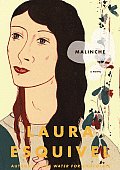
En este libro Laura Esquivel narra la aventura de la admirada y denostada amante de Hernán Cortés quien también fue la intérprete entre los españoles y aztecas durante la conquista. La narración es una mescla de imaginación y reconstrucción histórica que habeses es confusa y repetida.
Malinche creyó que el extranjero Hernán Cortés era la reencarnación del Dios Quetzalcóatl quien regresaba a poner fin a los terribles sacrificios humanos de la religión azteca, pero termina descubriendo la crueldad sangrienta de los conquistadores.
Posted by Rosa at 01:09 PM | Permalink | Comments (0)
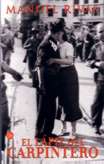
El lápiz del carpintero por Manuel Rivases una de esas novelas que no puedes dejar de leer hasta no terminarla. La novela empieza cuando Daniel Da Barca, republicano y médico durante la guerra civil española responde a un reportero que llega a entrevistarlo en su case de Galicia
A la vez que De Barca cuenta su historia Herbal, el guardia de la prisión, le cuenta lo que le pasaba por la mente durante esos años de locura a una joven prostituta del lugar donde termino trabajando después que el régimen franquista termina.
Herbal había sido la sombra vigilante del prisionero Da Barca y durante la historia podemos ver la mezcla del odio con la pasión, la admiración con los celos y la obligación con la obsesión. Herbal es acompañado por el espíritu del pintor que mato de un tiro en la sien. Como recuerdo lleva el lápiz carpintero de este pintor en la oreja. La presencia del pintor la ayuda a mirar el mundo con otros ojos diferentes y controlar sus emociones brutales.
Posted by Rosa at 12:56 PM | Permalink | Comments (0)
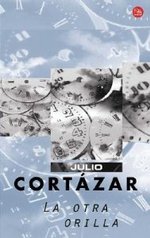
La otra orilla by Julio Cortázar
Book Description
Written between 1937 and 1945, these stories are Cortázar’s first leap into story telling. As a model of self-criticism, he refused to publish almost all of them; fifty years later critics acclaimed them as an impressive sample that anticipated the capacities of this magnificent writer. Whether it is with science fiction, or adapting popular mythological figures, Cortázar manages to make any subject contemporary, with a sober style, and always a revolutionary concept towards the fantastic.
The book is divided in to three parts. The first two parts "Plagios y traducciones" and "Historias de Gabriel Medrano" are similar in style - each story having an ambiguous ending. You are left doubting whether or not things really happen in reality. I did not like the third part as much- "Prolegómenos a la Astronomía."
The book is written in a manner that was very difficult for me to read. The sentences didn't flow nicely and there were many words that I had to look up. The stories were written in the early 1940s so this might be the reason why I had difficulty with the language.
Posted by Rosa at 09:28 PM | Permalink | Comments (0)
"Left Bank" by Kate Muir
I chose to read this book because of its lovely cover and was pleasantly surprise to find a clever and well written book by first time author Kate Muir.
Posted by Rosa at 10:17 PM | Permalink | Comments (0)
I have three weeks to go before baby #2 is born and can't move very easily so I'm catching up on my reading list. This morning I read

"All You Need to Be Impossibly French" by Helena Frith Powell
The book reads like a magazine article puffed up into book length. Some of the chapters are very boring and title is deceiving. From the title you think that you are going to learn to live like a French woman but instead you learn about what French women like such as buying fancy underwear.
Posted by Rosa at 11:37 AM | Permalink | Comments (0)

The Tipping Point: How Little Things Can Make a Big Difference
by Malcolm Gladwell
The book describes how certain types of people (connectors, mavens, and salesmen), and certain circumstances (the law of the few, the stickiness factor, and the power of context), can help turn something like a television show into epidemics. The book has some some interesting examples but overall I found it repetitive.
Posted by Rosa at 12:47 PM | Permalink | Comments (0)
La Piel del Cielo by Elena Poniatowska

The book starts off very promising but it slowly deteriorates to the point where I couldn't finish the last 30 pages. A couple years ago I read Hasta no verte, Jesus mio!. by the same author and really enjoyed it.
Posted by Rosa at 11:29 PM | Permalink | Comments (0)
Free Food for Millionaires by Min Jin Lee
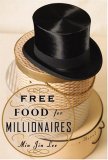
The book is a bit long with over 500 pages but it's engaging. The novel is about a young Korean-American woman, raised by status-conscious immigrant parents in Queens, who falls out with them after she graduates from Princeton. It's well written. I only wish their was a real ending to the novel.
Posted by Rosa at 08:37 PM | Permalink | Comments (0)
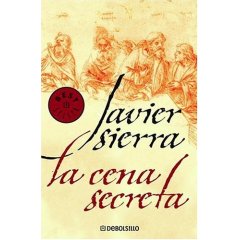 La Cena Secreta recently translated into English as The Secret Supper is a fascinating book that will entertain and make you think.
La Cena Secreta recently translated into English as The Secret Supper is a fascinating book that will entertain and make you think.
It's the story of a secret that lay hidden in the Leonardo Da Vinci painting 'The Last Supper' that threatens to undue the Catholic church in the late 1400s.
Many will unfairly compare this novel to The Da Vinci Code by Dan Brown but this is a more intellectual and sophisticated novel. I read the Spanish version so I am not sure how good the English translation is but it has gotten great reviews by newspapers like the NY Times.
Posted by Rosa at 12:29 PM | Permalink | Comments (0)